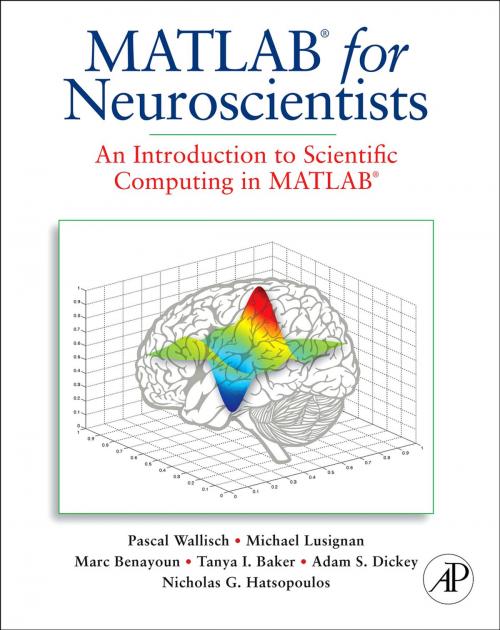MATLAB for Neuroscientists
An Introduction to Scientific Computing in MATLAB
Nonfiction, Health & Well Being, Psychology, Physiological Psychology, Medical, Specialties, Internal Medicine, Neuroscience| Author: | Pascal Wallisch, Michael E. Lusignan, Marc D. Benayoun, Tanya I. Baker, Adam Seth Dickey, Nicholas G. Hatsopoulos | ISBN: | 9780080923284 |
| Publisher: | Elsevier Science | Publication: | July 28, 2010 |
| Imprint: | Academic Press | Language: | English |
| Author: | Pascal Wallisch, Michael E. Lusignan, Marc D. Benayoun, Tanya I. Baker, Adam Seth Dickey, Nicholas G. Hatsopoulos |
| ISBN: | 9780080923284 |
| Publisher: | Elsevier Science |
| Publication: | July 28, 2010 |
| Imprint: | Academic Press |
| Language: | English |
Matlab is the accepted standard for scientific computing, used globally in virtually all Neuroscience and Cognitive Psychology laboratories. For instance, SPM, the most used software for the analysis and manipulation of fMRI images in research and clinical practice is fully programmed in matlab, and its use of the possibility to allow for sophisticated software modules to be freely added to the software has established it as the by far dominant software in the field. Many universities now offer, or are beginning to offer matlab introductory courses in their neuroscience and psychology programs. Nevertheless, so far there hasn't been a textbook specific to this market, and the use of the plethora of existing engineering focused Matlab textbooks is notoriously difficult for teaching the package in those environments.
This is the first comprehensive teaching resource and textbook for the teaching of Matlab in the Neurosciences and in Psychology. Matlab is unique in that it can be used to learn the entire empirical and experimental process, including stimulus generation, experimental control, data collection, data analysis and modeling. Thus a wide variety of computational problems can be addressed in a single programming environment. The idea is to empower advanced undergraduates and beginning graduate students by allowing them to design and implement their own analytical tools. As students advance in their research careers, they will have achieved the fluency required to understand and adapt more specialized tools as opposed to treating them as "black boxes".
Virtually all computational approaches in the book are covered by using genuine experimental data that are either collected as part of the lab project or were collected in the labs of the authors, providing the casual student with the look and feel of real data. In some rare cases, published data from classical papers are used to illustrate important concepts, giving students a computational understanding of critically important research.
The ability to effectively use computers in research is necessary in an academic environment that is increasingly focused on quantitative issues. Matlab represents an ideal language of scientific computing. It is based on powerful linear algebra structures which lend themselves to empirical problems on the one hand, while at the same time allowing the student to make rapid problem-oriented progress (particularly in terms of visualization of data points) without having to lose focus by worrying too much about memory allocation and other "plumbing" minutiae as would be required in other, more low-level programming languages such as C or C++.
Currently, there are several books that provide introductions to Matlab that are either too generic and fundamental or too irrelevant for neuroscientists and cognitive psychologists who typically face a very circumscribed range of problems in data collection, data analysis and signal processing. Some non-book tutorials and primers that are in use in the community are typically out of date. Matlab versions are usually not backwards compatible. Many commands and functions used in older tutorials and primers, such as "flops" won't work in current versions of Matlab, necessitating a book that is timely and up-to-date.
The complete lack of a relevant resource in this area, combined with a clearly felt need for such a text provided the primary and initial impetus for this project.
The authors provide such a dearly needed resource adapting and pooling materials that developed for and used in highly rated courses involving the use of Matlab in Neuroscience at the University of Chicago. Two co-authors (PW and NH) have presented their respective work on teaching Matlab at national meetings and two of the co-authors (PW and MB) were awarded the coveted University of Chicago's Booth Prize for excellence in teaching these courses. (http://chronicle.uchicago.edu/070524/boothprize.shtml ).
* The first comprehensive textbook on Matlab with a focus for its application in Neuroscience
* Problem based educational approach with many examples from neuroscience and cognitive psychology using real data
* Authors are award winning educators with strong teaching experience
* Instructor's Website with figurebank, additional problems and examples, solutions, etc
This is the first comprehensive teaching resource and textbook for the teaching of Matlab in the Neurosciences and in Psychology. Matlab is unique in that it can be used to learn the entire empirical and experimental process, including stimulus generation, experimental control, data collection, data analysis and modeling. Thus a wide variety of computational problems can be addressed in a single programming environment. The idea is to empower advanced undergraduates and beginning graduate students by allowing them to design and implement their own analytical tools. As students advance in their research careers, they will have achieved the fluency required to understand and adapt more specialized tools as opposed to treating them as "black boxes".
Virtually all computational approaches in the book are covered by using genuine experimental data that are either collected as part of the lab project or were collected in the labs of the authors, providing the casual student with the look and feel of real data. In some rare cases, published data from classical papers are used to illustrate important concepts, giving students a computational understanding of critically important research.
The ability to effectively use computers in research is necessary in an academic environment that is increasingly focused on quantitative issues. Matlab represents an ideal language of scientific computing. It is based on powerful linear algebra structures which lend themselves to empirical problems on the one hand, while at the same time allowing the student to make rapid problem-oriented progress (particularly in terms of visualization of data points) without having to lose focus by worrying too much about memory allocation and other "plumbing" minutiae as would be required in other, more low-level programming languages such as C or C++.
Currently, there are several books that provide introductions to Matlab that are either too generic and fundamental or too irrelevant for neuroscientists and cognitive psychologists who typically face a very circumscribed range of problems in data collection, data analysis and signal processing. Some non-book tutorials and primers that are in use in the community are typically out of date. Matlab versions are usually not backwards compatible. Many commands and functions used in older tutorials and primers, such as "flops" won't work in current versions of Matlab, necessitating a book that is timely and up-to-date.
The complete lack of a relevant resource in this area, combined with a clearly felt need for such a text provided the primary and initial impetus for this project.
The authors provide such a dearly needed resource adapting and pooling materials that developed for and used in highly rated courses involving the use of Matlab in Neuroscience at the University of Chicago. Two co-authors (PW and NH) have presented their respective work on teaching Matlab at national meetings and two of the co-authors (PW and MB) were awarded the coveted University of Chicago's Booth Prize for excellence in teaching these courses. (http://chronicle.uchicago.edu/070524/boothprize.shtml ).
* The first comprehensive textbook on Matlab with a focus for its application in Neuroscience
* Problem based educational approach with many examples from neuroscience and cognitive psychology using real data
* Authors are award winning educators with strong teaching experience
* Instructor's Website with figurebank, additional problems and examples, solutions, etc
Matlab is the accepted standard for scientific computing, used globally in virtually all Neuroscience and Cognitive Psychology laboratories. For instance, SPM, the most used software for the analysis and manipulation of fMRI images in research and clinical practice is fully programmed in matlab, and its use of the possibility to allow for sophisticated software modules to be freely added to the software has established it as the by far dominant software in the field. Many universities now offer, or are beginning to offer matlab introductory courses in their neuroscience and psychology programs. Nevertheless, so far there hasn't been a textbook specific to this market, and the use of the plethora of existing engineering focused Matlab textbooks is notoriously difficult for teaching the package in those environments.
This is the first comprehensive teaching resource and textbook for the teaching of Matlab in the Neurosciences and in Psychology. Matlab is unique in that it can be used to learn the entire empirical and experimental process, including stimulus generation, experimental control, data collection, data analysis and modeling. Thus a wide variety of computational problems can be addressed in a single programming environment. The idea is to empower advanced undergraduates and beginning graduate students by allowing them to design and implement their own analytical tools. As students advance in their research careers, they will have achieved the fluency required to understand and adapt more specialized tools as opposed to treating them as "black boxes".
Virtually all computational approaches in the book are covered by using genuine experimental data that are either collected as part of the lab project or were collected in the labs of the authors, providing the casual student with the look and feel of real data. In some rare cases, published data from classical papers are used to illustrate important concepts, giving students a computational understanding of critically important research.
The ability to effectively use computers in research is necessary in an academic environment that is increasingly focused on quantitative issues. Matlab represents an ideal language of scientific computing. It is based on powerful linear algebra structures which lend themselves to empirical problems on the one hand, while at the same time allowing the student to make rapid problem-oriented progress (particularly in terms of visualization of data points) without having to lose focus by worrying too much about memory allocation and other "plumbing" minutiae as would be required in other, more low-level programming languages such as C or C++.
Currently, there are several books that provide introductions to Matlab that are either too generic and fundamental or too irrelevant for neuroscientists and cognitive psychologists who typically face a very circumscribed range of problems in data collection, data analysis and signal processing. Some non-book tutorials and primers that are in use in the community are typically out of date. Matlab versions are usually not backwards compatible. Many commands and functions used in older tutorials and primers, such as "flops" won't work in current versions of Matlab, necessitating a book that is timely and up-to-date.
The complete lack of a relevant resource in this area, combined with a clearly felt need for such a text provided the primary and initial impetus for this project.
The authors provide such a dearly needed resource adapting and pooling materials that developed for and used in highly rated courses involving the use of Matlab in Neuroscience at the University of Chicago. Two co-authors (PW and NH) have presented their respective work on teaching Matlab at national meetings and two of the co-authors (PW and MB) were awarded the coveted University of Chicago's Booth Prize for excellence in teaching these courses. (http://chronicle.uchicago.edu/070524/boothprize.shtml ).
* The first comprehensive textbook on Matlab with a focus for its application in Neuroscience
* Problem based educational approach with many examples from neuroscience and cognitive psychology using real data
* Authors are award winning educators with strong teaching experience
* Instructor's Website with figurebank, additional problems and examples, solutions, etc
This is the first comprehensive teaching resource and textbook for the teaching of Matlab in the Neurosciences and in Psychology. Matlab is unique in that it can be used to learn the entire empirical and experimental process, including stimulus generation, experimental control, data collection, data analysis and modeling. Thus a wide variety of computational problems can be addressed in a single programming environment. The idea is to empower advanced undergraduates and beginning graduate students by allowing them to design and implement their own analytical tools. As students advance in their research careers, they will have achieved the fluency required to understand and adapt more specialized tools as opposed to treating them as "black boxes".
Virtually all computational approaches in the book are covered by using genuine experimental data that are either collected as part of the lab project or were collected in the labs of the authors, providing the casual student with the look and feel of real data. In some rare cases, published data from classical papers are used to illustrate important concepts, giving students a computational understanding of critically important research.
The ability to effectively use computers in research is necessary in an academic environment that is increasingly focused on quantitative issues. Matlab represents an ideal language of scientific computing. It is based on powerful linear algebra structures which lend themselves to empirical problems on the one hand, while at the same time allowing the student to make rapid problem-oriented progress (particularly in terms of visualization of data points) without having to lose focus by worrying too much about memory allocation and other "plumbing" minutiae as would be required in other, more low-level programming languages such as C or C++.
Currently, there are several books that provide introductions to Matlab that are either too generic and fundamental or too irrelevant for neuroscientists and cognitive psychologists who typically face a very circumscribed range of problems in data collection, data analysis and signal processing. Some non-book tutorials and primers that are in use in the community are typically out of date. Matlab versions are usually not backwards compatible. Many commands and functions used in older tutorials and primers, such as "flops" won't work in current versions of Matlab, necessitating a book that is timely and up-to-date.
The complete lack of a relevant resource in this area, combined with a clearly felt need for such a text provided the primary and initial impetus for this project.
The authors provide such a dearly needed resource adapting and pooling materials that developed for and used in highly rated courses involving the use of Matlab in Neuroscience at the University of Chicago. Two co-authors (PW and NH) have presented their respective work on teaching Matlab at national meetings and two of the co-authors (PW and MB) were awarded the coveted University of Chicago's Booth Prize for excellence in teaching these courses. (http://chronicle.uchicago.edu/070524/boothprize.shtml ).
* The first comprehensive textbook on Matlab with a focus for its application in Neuroscience
* Problem based educational approach with many examples from neuroscience and cognitive psychology using real data
* Authors are award winning educators with strong teaching experience
* Instructor's Website with figurebank, additional problems and examples, solutions, etc















